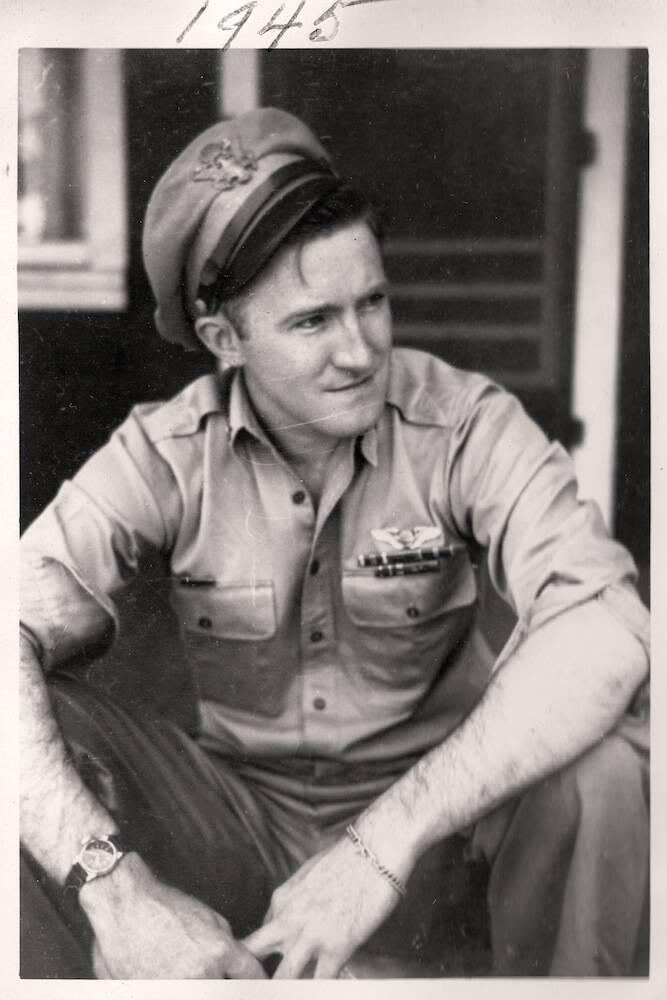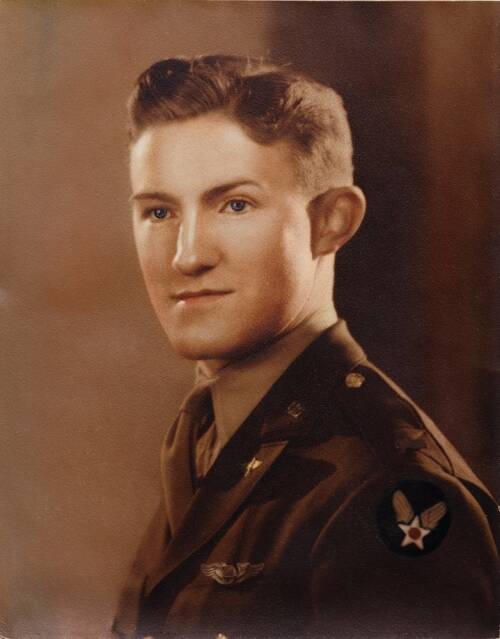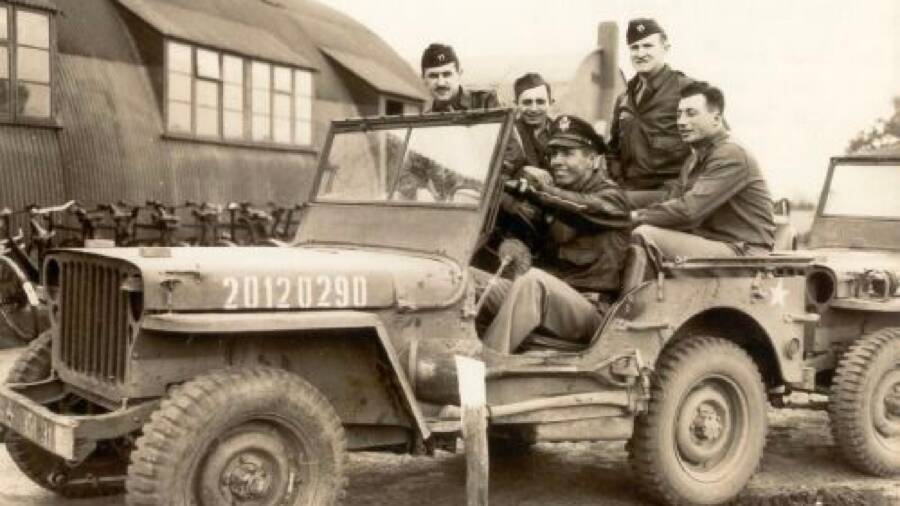After a rocky start beset with mishaps and air sickness, Harry Herbert Crosby became a key member of the legendary "Bloody 100th" Bomb Group, World War II's "masters of the air."

Rebecca Crosby HutchinsonHarry Crosby flew 32 missions during World War II with the 100th Bomb Group’s “masters of the air.”
As 1941 was drawing to a close, Harry Crosby was consumed with both a love affair with the woman who would become his wife as well as his studies at the University of Iowa. But when the Japanese attacked Pearl Harbor on Dec. 7, he decided to put both aside. Crosby quickly enlisted in the Army Air Corps, and was soon sent to fight in Europe as a navigator.
Serving with the 100th Bomb Group, Harry Crosby would go on to fly a full tour of 25 missions, plus seven more. Despite a rocky start — Crosby initially struggled with air sickness and once missed his target in England due to a navigation error — he soon became a capable navigator and a crucial member of the 100th. Crosby finished the war with the rank of Lt. Colonel and was awarded several medals, including the Distinguished Flying Cross, Bronze Star, and Croix de Guerre.
Harry Crosby’s story, and the story of other airmen in the 100th Bomb Group including Major Gale Cleven, Major John Egan, and Major Robert Rosenthal, is told in the series Masters of the Air.
This is the real story of Harry Crosby and his heroics during World War II.
Harry Crosby Enlists In The Army Air Corps
Born in 1919, Harry Herbert Crosby grew up in Iowa. There, he enjoyed an idyllic childhood before enrolling at the University of Iowa to complete a Master of Arts in writing. Crosby was in the midst of his studies — and what he feared was a one-sided love affair with his future wife — when the Japanese attacked Pearl Harbor on Dec. 7, 1941.
Crosby, like men across the nation, decided to immediately enlist. After marrying his girlfriend, he signed up for the Army Air Corps to become a pilot.
“The week after Pearl Harbor I enlisted in the Army Air Corps,” Crosby later explained, according to the National Air And Space Museum. “They were taking almost everyone…[but] I washed out in twelve hours and six minutes,” explaining his lack of success as a pilot.

Crosby FamilyHarry Crosby after completing his navigation training.
Crosby indeed hadn’t cut it as a pilot but he had a good grasp on mathematics, so he was assigned to be a navigator instead. He was assigned to the 100th Bomb Group and told that he would fly in B-17 planes.
However, as Donald Miller writes in his 2006 book about the 100th Bomb Group, Masters of the Air: America’s Bomber Boys Who Fought the Air War Against Nazi Germany, Crosby’s relationship with the bombers had an inauspicious start. The first time he saw one land, it crashed and killed everyone onboard.
In the beginning, Crosby had other problems as well. He fretted about his ability as a navigator, and suffered from severe air sickness at low altitudes. But by the spring of 1943, Crosby prepared to ship out.
“The day is here. Tomorrow I leave for war,” he wrote his father on May 29, 1943. “I don’t know what to think about it. I’m rather scared — that’s a pretty big ocean to cross and a pretty big war when I get there.”
Navigating For The 100th Bomb Group’s “Masters Of The Air”
Things in Europe for Harry Crosby were rocky at first. That June, he made a navigational error that caused his plane to miss England. Miller writes that they veered dangerously close to Nazi-occupied France before crash landing with frozen landing gear on the English coast.
But things quickly improved. Crosby grew in confidence and competence and soon became a lead navigator. He was later awarded a Distinguished Flying Cross for his performance during a bombing mission on July 24, 1943, during which Crosby “made possible the bombing of a vital objective under difficult conditions… the mission was accomplished without loss.”

100th Bomb Group FoundationDespite a rocky start, Harry Crosby soon became a capable navigator.
A month later, Crosby even had enough confidence to make a surprising suggestion to his fellow airmen. As they embarked on a raid, Crosby realized that the bombardier had picked out a target in Bonn. Crosby had listened to a Beethoven album the night before and learned by reading the inside cover that the composer had been born in Bonn and gone to school there.
“I looked down and saw a series of buildings which I presumed to be the University of Bonn. Instantly there flashed through my mind the thought, ‘That must be where Beethoven went to school!'” Crosby recalled according to the 100th Bomb Group Foundation.
Crosby radioed a message to the others: “We can’t bomb Bonn. That is where Beethoven went to school.”
Though his announcement was met with groans, Crosby’s fellow airmen agreed to call off the bombing. Instead, as Miller writes: “they found a marshalling yard in the Ruhr and obliterated it.”

100th Bomb Group FoundationMen of the 100th Bomb Group: Front, Woodrow “Woodie” McGill and Jim Douglas, and back from left, Saul Levitt, Harry Crosby, Robert “Rosie” Rosenthal.
Before D-Day the next year, Harry Crosby also played a crucial role.
“In the week before D-Day, I worked 24 hours a day superintending the preparation of maps, flight plans and formation for over a hundred different missions and variations,” Crosby recalled. “As a result, I worked for 75 hours straight. The night before D-Day I was a zombie and was ordered to go to my quarters and get some sleep.”
But when the navigator woke up, he found that the operation had already ended.
“Twenty-four hours later I awakened and it was all over!” he exclaimed. “The BBC was announcing the landings and Axis Sally was corroborating. And I had missed it all!”
In all, Harry Crosby served a full tour of 25 missions plus seven more and remained in England until Germany surrendered in May 1945. Then he, like the other airmen of the 100th, returned to the civilian life they’d left behind.
Harry Crosby’s Life After World War II
Back in Iowa, Harry Crosby resumed the life he’d left behind after Pearl Harbor. He returned to his wife, and graduated from Iowa University with an M.A. in 1947. Crosby taught, developed a pilot training program in Pakistan, and wrote a book about his experience in World War II, A Wing and a Prayer.
In his book, Crosby penned a stirring description of what B-17s — the same kind of plane that he’d watched crash land at the beginning of his career — had come to mean to him and his fellow “masters of the air.”
“No American or East Anglian can think seriously about B-17s today without feeling the tug of their great purpose and destiny,” Crosby wrote in his book. “They were the two-fisted tin cans that tore the roof off a deranged empire. When they swarmed over occupied Europe, people blessed them. One day, when several hundred of them roared across Holland, a little girl cried out in fear. Her father put his arm around her, took her hand, and looked up. ‘Listen to it, Helene,’ he told her. ‘It’s the music of angels.'”
Harry Crosby died in Massachusetts in 2010 at the age of 91. At the assisted living facility where he spent his last days, he was known as Mr. Wonderful, because whenever anyone asked him how he was doing, he’d reply with an enthusiastic “Wonderful!”
After reading about Harry Crosby of the 100th Bomb Group, look through these astonishing World War II facts. Then, discover the stories of 11 resistance fighters who took on the Nazis.





